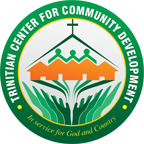ALUMNI CORNER
CONTACT US
Address: Cathedral Heights, 275 E. Rodriguez Sr. Avenue,
Quezon City, Philippines
Trunkline: (+632) 8702.2882
High School: (+632) 8725-5980
Telephone Directory
_____________
Community Development
 The Trinitian Center for Community Development is the official arm for Community Extension Service that supports Trinity University of Asia in carrying out its Vision and Mission of involving her constituents to live a LIFE that is GOD-centered and in service to the community.
The Trinitian Center for Community Development is the official arm for Community Extension Service that supports Trinity University of Asia in carrying out its Vision and Mission of involving her constituents to live a LIFE that is GOD-centered and in service to the community.







